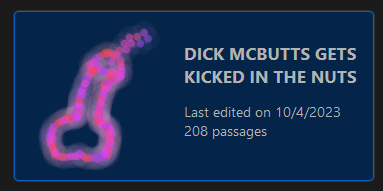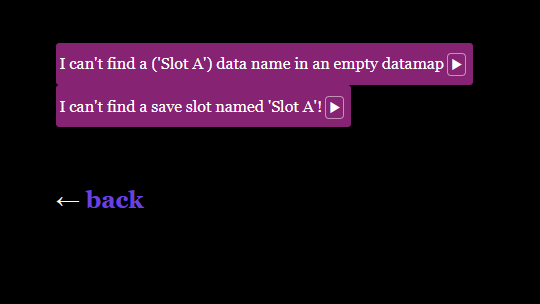New day, new reviews. Still sick.
Yesterday, I finished the games without any indicated length. Today, I’ll get into the 2+h entries (maybe doing a long, then a small one).
First one is another parser ;-;
Milliways: the Restaurant at the End of the Universe
Entry
Forenote: I have not played HHGG, but have read all the books.
M:REU is a very large parser game, reminiscent of the old Infocom era, and very much a love letter to the original HHGG game. The story follows the event of the second book of the HHGG series, in which the protagonist makes their way towards Milliway, the restaurant at the end of the universe. It combines puzzles and exploration, and includes hints and a walkthrough. It can’t be completed in 2h (afaik).
When starting the game, I knew I would not be able to finish it within the 2h mark (the beta call, mentioned a 8h-long playthrough…), nor would I have been able to go through the different parts without losing (its difficulty being cruel, one wrong move and you die). But I did not expect the quality of the game to be this impressive, considering this is the first game of this author and the fact that the game had been re-coded a few months prior to the comp.
Through my limited playthrough (I managed to get to the 4th location?), it is clear this was a labour of love for the old Infocom games, and the HHGG universe. The game manages to encapsulate the wittiness of the books so well, from the description of your actions, to the error messages, or the in-game hints. I gladly tried to die, just to see the funny messages, and the game calling me a noob for being a bad player.
Some of the puzzles seem a bit obtuse, and require either knowledge of the story or some trial an error (thank you, walkthrough for the help). They are definitely not meant for first-time parser players. Even trying to understand the hints, or follow the walkthrough, it is pretty easy to make an error and see your progress blocked completely.
Close to the 2h-mark, I stumbled into the Milliway kitchen, tried (and failed) to wrangle with the cupboard and my inventory. At some point, the cupboard just refused to open, and the timer rang. I still tried to play a tiny bit more, undoing previous actions and redo the puzzle, but alas, I could not get it past (is it maybe a bug? or did I miss something obvious?).
Honestly, from the little I played, it is really impressive, and could pass for an official game.
Maybe I’ll restart it later and try to play it fully.
This time, I made sure to log a transcript at the start… but I played online, so it wouldn’t let me download it or save it in the tempfiles? From what I saw on the IFComp website, it should be available to the author on their side. So Max, if you see a transcript spamming Z in the Milliway kitchen section, that’s probably me…

